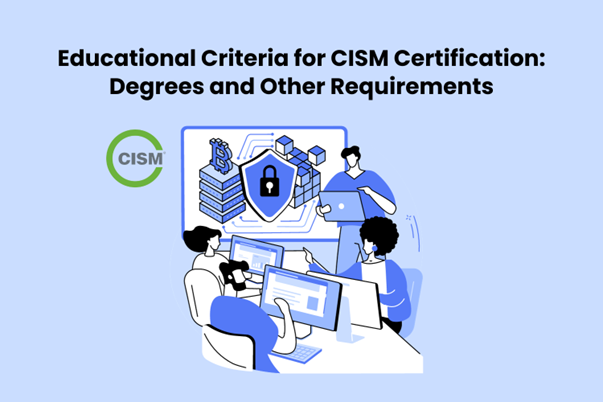
In the world of information technology and cybersecurity, professionals seek to enhance their skill set and credentials to stay competitive. The Certified Information Security Manager (CISM) certification stands as a beacon of expertise and proficiency in managing, designing, and overseeing an organization’s information security program. Aspirants often wonder about the educational criteria and prerequisites necessary to embark on this prestigious journey. Understanding the educational requisites for CISM certification and the various pathways to fulfill them is pivotal for those aiming to bolster their careers in this domain. Let’s delve into the essential educational requirements and how individuals can acquire the necessary qualifications through CISM Certification Training.
CISM certification holds immense value in the realm of information security management, validating an individual’s capabilities in assessing, designing, and managing an enterprise’s information security. One of the fundamental queries for aspiring candidates revolves around the educational prerequisites necessary to qualify for the CISM exam. In this blog, we will delve into the details of How to Become CISM Certified and the required qualifications for the same.
Table of Contents
- Educational Background
- Degrees and Qualifications
- CISM Certification Training
- How to Become CISM Certified
- Conclusion
Educational Background
Candidates must meet rigorous educational requirements set out by the Information Systems Audit and Control Association (ISACA), which is in charge of the CISM certification. To get certified, one must have worked in information security management for at least five years, covering all the areas listed in the CISM job practice. Certain academic accomplishments, however, can stand in for this experience requirement.
Degrees and Qualifications
People who want to get certified as CISMs will have a much easier time of it if their academic history is in information security or a closely related subject. Some of the necessary job experience can be replaced by a bachelor’s or master’s degree in the applicable field.
A lesser amount of work experience may be required if one holds one of the several degrees or certificates recognised by ISACA. If you have a bachelor’s degree from a recognised university, you can count two years of experience towards your degree. If you have a master’s degree, you can count one more year towards your degree, bringing your total number of years of experience in information security management down to a minimum of three.
Having applicable credentials, such as a Certified Information Systems Auditor (CISA) or Certified Information Systems Security Professional (CISSP), might also substitute for some of the necessary experience.
In addition to official degrees, CISM certification training programmes and seminars provide ongoing education that greatly enhances a candidate’s knowledge and abilities, which is useful for the certification exam.
CISM Certification Training
A great approach to make sure you have what it takes to pass the CISM test is to enrol in a training programme that has been approved by the industry. Candidates may expect a well-organized education that covers all the bases in these programmes, which are based on the CISM job practice.
Training of this kind usually consists of in-depth class discussions, real-world case studies, and instruction from experts in the subject. Taking these classes will help you study for the test and have a better grasp of the fundamentals and best practices of information security management.
How to Become CISM Certified:
Navigating the path to becoming CISM certified involves a strategic approach considering both educational and experiential aspects. Here’s a concise guide:
- Assess Eligibility: Evaluate your educational background and work experience to determine eligibility for the CISM certification. Remember, qualifying degrees or certifications might reduce the required work experience.
- Acquire Knowledge: Engage in CISM certification training programs offered by reputable institutions or organizations to acquire the necessary expertise aligned with the CISM job practice domains.
- Gain Experience: Accumulate relevant work experience in information security management, ensuring it aligns with the domains specified by ISACA.
- Apply for the Exam: Upon meeting the eligibility criteria, submit your application for the CISM exam through the ISACA website.
- Prepare and Pass the Exam: Diligently prepare for the exam using study materials, practice tests, and resources provided by ISACA or credible training providers. Upon passing the exam, meet the necessary professional requirements for certification.
Conclusion
Certifying as a CISM requires not just a degree from an accredited institution but also relevant work experience and ongoing education through various IT Security & Data Protection Courses. Aspiring applicants can fulfil the requirements for this prestigious credential through a variety of educational courses, including degrees, certificates, and training. Becoming a Certified Information Security Manager is within reach with a well-planned combination of coursework, work experience, and test prep.
